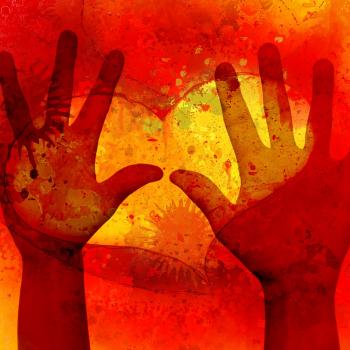Last week, a video went viral.
It was a video of 56-year-old Anthony Torres shaving his face while riding on a commuter train from NYC to New Jersey, secretly filmed by a fellow passenger.
The video was viewed by millions of people, many of whom commented that Torres was a slob. An animal. Nasty and gross.
A reporter for the Washington Post tracked Torres down and asked him the question everyone was wondering: Why were you shaving on a train?
Torres explained that he was homeless. He’d exceeded the number of nights he could stay at a homeless shelter in NYC, so he slept under bridges, where he’d been robbed and assaulted multiple times.
“There were a lot of nights where I laid under the bridge and cried,” he told the reporter.
He decided it might be easier to be homeless in Philadelphia than NYC, but he needed a new sleeping bag. So he asked his brother, who lived in New Jersey, if he could come home to retrieve a sleeping bag on his way to Philadelphia.
His brother agreed, and sent him money for a train ticket.
Torres hadn’t showered in days, and said he felt dirty. When he got to the train station, he asked a transit worker if he could use the bathroom to clean up, and the worker reportedly said no.
Torres didn’t want to show up at his brother’s house dirty and disheveled, so on the 80-mile train ride from NYC to NJ, he shaved.
By the time he arrived at his brother’s house, the video had gone viral. Torres’ niece showed it to him, and Torres was utterly embarrassed. He told his family he would never ride a train again.
When the passenger who secretly filmed and posted the video learned Torres’ back story, he apologized to Torres, and later licensed the video so he could monetize the viral sensation and give Torres the money.
Another viewer started a GoFundMe campaign which, as I’m writing this, has raised more than $31,000.
Torres’ story represents the best in us, and the worst in us.
It represents the harm we can do when we judge, bully and mock people we don’t even know.
It also represents the good we can do when we respond with generosity and empathy.
And it reminds us of the power we have to “go viral.”
I work in medicine, so it’s interesting to me that we use a biological term like “viral” to describe technology. Why do we say videos “go viral,” instead of saying that they “go bacterial”?
Because bacteria are autonomous pathogens that thrive on their own. Viruses, on the other hand, can’t exist on their own. They require a host.
My friends, the reason that both negative and positive reactions can “go viral” in our society is because we are all hosts. We are required to generate the clicks and likes and shares and comments it takes for millions of people to mock a homeless man who’s trying to look presentable when he shows up to a family member’s home to borrow a used sleeping bag so he can try being homeless in a different city. And we are required to generate the clicks and likes and shares and empathy and generosity that respond to the Anthony Torres’ in our world with compassion and understanding.
We are the power. We are the hosts. We are the ones who can make good or evil go viral. With each response, with each word, with each action, we make important choices.
What will we use our collective power to replicate in our world today?












